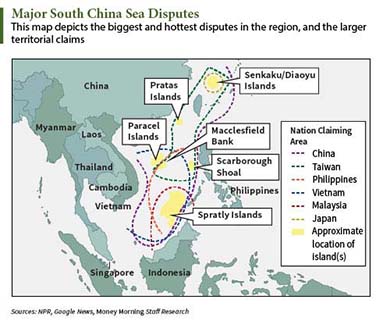
China suffered a major defeat yesterday (Tuesday) as an international court - The Hague Tribunal - rebuked the country's claims on waters home to the busiest shipping routes in the world.
The judges ruled that the portion of the South China Sea claimed by both China and the Philippines belongs solely to the Philippines.
Furthermore, the court concluded that Chinese efforts to create man-made islands - expansionary tactics it's imposed for the sake of regional dominance - on top of atolls and reefs in the region were illegal.
If China rejects The Hague's ruling with further attempts to alter the South China Sea by dredging additional islands, or if the country continues to claim more territories in the disputed region, it will likely be seen by much of the world as an "outlaw on the wrong side of justice," reported Time Tuesday.
Here's why that could mean war with China...
Will the U.S. Go to War with China in the South China Sea?
The United States has long backed the Philippines' claim in the South China Sea dispute and has positioned itself in the territory to maintain "freedom of navigation" for the sake of global trade.
But China sees the U.S.' position as nothing but self-interested.
Before yesterday's ruling, China made numerous threats to the U.S. about its involvement. It also vowed to completely ignore The Hague's decision.
Must See: Trump’s Secret Weapon Set to Foil China’s Master Plan
And now, after the ruling, Beijing indeed says it will defend its interests in the South China Sea, no matter the cost.
Here's a look at the possible near-term outcomes in the dispute...
We Could Be Seeing the First Stages of an All-Out Arms Race
Money Morning Executive Editor William Patalon III has been following the international clash since 2012 (way before the mainstream media picked up on it). He thinks China will follow through with its vow to defend its dominance in the region in two specific ways...
"The bigger picture here is one that's both economic and military," Patalon writes. "And it's a big, big deal..."
You see, in keeping with its disregarding nature, China could continue to increase its island- building and even impose a blockade on Philippine fishermen that would cut off their access to resource-laden waters. China did this on a Philippine shoal in 2014, which forced Manila to take a Chinese civilian ship, load it full of foreign journalists and supplies, and threaten to breach the blockade with it. By doing so, China would have to make one of two choices...
- Shoot the ship out of the water
- Let the ship pass
China chose the latter, not wanting to cause the deaths of journalists from all over the globe.
However, Gregory Poling of the Center for Strategic and International Studies warned on June 30 via CNBC that "we could very well see a repeat of that episode with a stronger Chinese response" - meaning this time China would go ahead and "shoot the ship out of the water."
Patalon, however, expects even more to arise from this maritime conflict...
He believes we're witnessing the first stages of an all-out arms race.
"These 'triggers' are combining to fuel an Asian-focused arms race that's staggering in magnitude," he writes. "IHS Jane's says arms spending in the Asia-Pacific will climb 23% a year to reach $533 billion by 2020. That will put it on par with North America, which currently accounts for half of all global defense spending - and which, according to recent statistics I've seen - will fall to a third of global spending by decade's end."
And this Asian arms race isn't just a spending sprint. As Patalon told his Private Briefing subscribers in a two-part series back in March, there's also a technological race, where stealth aircraft, aerial and seagoing drones, missiles, sensor systems, and missile-interceptor know-how will just keep advancing.
Which brings us to another likely near-term outcome in the immediate wake of the tribunal's decision: a U.S.-China air war...
The U.S.-China War Could Happen in the Sky

China may also respond by soon declaring an air-defense identification zone over the South China Sea, as it did over the East China Sea in 2013. By implementing this zone, China would require any aircraft entering its airspace to identify itself.
[mmpazkzone name="in-story" network="9794" site="307044" id="137008" type="4"]
Image caption: U.S. aircraft carriers on patrol in the South China Sea.
This may not seem like a particularly stark or subversive move, but the United States, you see, has a history of ignoring China's air-defense ID zones. Since China has been (illegally) building airstrips on shoals and reefs in the South China Sea, it could deploy fighter aircraft to these regions shortly before declaring the entire sea an air-defense identification zone.
This would provoke another one of Patalon's "triggers" - only from the U.S this time. - as American aircraft carriers are already traversing the disputed area. One take-off and we'd be invading China's declared air space.
Is War With China Imminent?
There are some optimists out there who think we won't go to war with China. For example, Dr. Taylor Fravel, an international security expert at MIT, told the Christian Science Monitor yesterday that the next outcome could be all about "quiet diplomacy behind the scenes."
You see, China could simply choose to ignore the ruling and proceed with its activities in violation of the tribunal's decision. China could realize that the $5 trillion in trade that passes through the region annually is of more importance to everyone involved. This would keep the U.S. Navy present in the South China Sea to instate its "freedom of navigation" front.
Basically, things could proceed just as they were pre-ruling, for now.
Also, bilateral talks between China and the Philippines might help.
But it's important to remember that, whatever happens next in the global dispute, the United States will most certainly remain a key player.
"The bottom line," writes Patalon, "no matter who ends up in the White House, the North Korea/South China Sea standoff will rank high on their 'trouble spots' list. And that means defense spending - especially on new technologies - will be a good long-term bet for investors..."
What Investors Need to Know About the South China Sea Showdown
As one of the first market analysts to warn about Beijing's desire to cordon off the South China Sea (he even beat The New York Times to the media punch), Patalon wants everyone to understand the delicate balance at stake in the situation.
No matter what the outcome, there are profits to be made. And Patalon knows just where those opportunities lie -- take a look...
Follow us on Facebook and Twitter to stay updated on South China Sea coverage.
Related Articles:
- Time: Showdown Now Looming Over the South China Sea
- CNBC: Beijing Defiant on South China Sea as International Court Nears Judgement on Philippines Case


